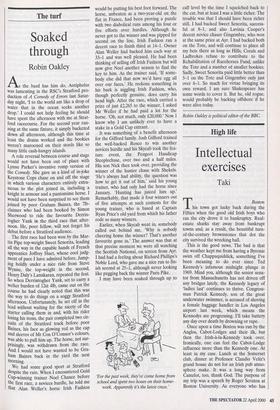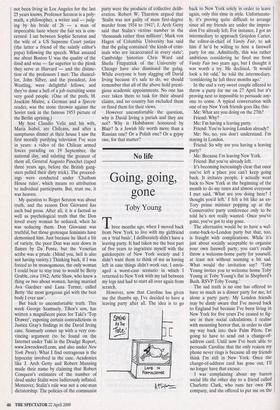High life
Intellectual exercises
Taki
Boston This town got lucky back during the Fifties when the good old Irish boys who ran the city drove it to bankruptcy. Real- estate sharks stay away from bankrupt towns and, as a result, the beautiful turn- of-the-century brownstones that dot the city survived the wrecking ball.
This is the good news. The bad is that the weather kept me from having a Byronic swim off Chappaquiddick, something I've been meaning to do ever since Ted Kennedy's infamous midnight plunge in 1969. Mind you, although the senior sena- tor from Massachusetts has not driven off any bridges lately, the Kennedy legacy of `ladies last' continues to thrive. Congress- man Patrick Kennedy, son of the great underwater swimmer, is accused of shoving a female baggage handler in Los Angeles airport last week, which means the Kennedys are progressing. I'll take battery any day over death by drowning or rape. Once upon a time Boston was run by the Anglos, Cabot-Lodges and their ilk, but then the Irish-a-la-Kennedy took over. Ironically, one can feel the Cabot-Lodge influence more than the Kennedy one. At least in my case. Lunch at the Somerset club, dinner at Professor Claudio Veliz's grand house do not for an Irish pub atmo- sphere make. It was a long way from Camelot, too, thank God. The purpose of my trip was a speech by Roger Scruton at Boston University. As everyone who has not been living in Los Angeles for the last 25 years knows, Professor Scruton is a poly- math, a philosopher, a writer and — judg- ing by his bride of 26 — a man of impeccable taste where the fair sex is con- cerned. I sat between Sophie Scruton and the wife of a US Supreme Court justice (the latter a friend of the saintly editor's papa) following the speech. What amazed me about Boston U was the quality of the food and wine — far superior to the plonk they serve at Harvard — and the distinc- tion of the professors I met. The chancel- lor, John Silber, and the president, Jon Westling, were delightful fellows, and they've done a hell of a job recruiting some very good people. (One of the profs, H. Joackim Maitre, a German and a Speccie reader, was the stone thrower against the Soviet tank in the famous 1953 picture of the Berlin uprising.) My host Claudio Veliz and his wife, Maria Isabel, are Chileans, and after a sumptuous dinner at their house I saw the first morally purifying television I've seen in years: a video of the Chilean armed forces parading on 19 September, the national day, and saluting the greatest of them all, General Augusto Pinochet (taped three years ago, before the British gang- sters pulled their dirty trick). The proceed- ings were conducted under 'Chatham House rules', which means no attribution to individual participants. But, trust me, it was heaven.
My question to Roger Scruton was about truth, and the reason Don Giovanni has such bad press. After all, it is a factual as well as psychological truth that the Don loved every woman he seduced, when he was seducing them. Don Giovanni was truthful, but those grotesque feminists have demonised him. Just because he liked a bit of variety, the poor Don was sent down in flames by Da Ponte, but the Venetian scribe was a prude. (Mind you, hell is also not having variety.) Thinking back, if I was forced to be monogamous, the only woman I could bear to stay true to would be Betty Grable, circa 1942; Artie Shaw, who knew a thing or two about women, having married Ava Gardner and Lana Turner, called Betty 'the most gorgeous girl with the best body I ever saw'.
But back to uncomfortable truth. This week George Szamuely, Tibor's son, has written a magnificent piece for Taki's 'Top Drawer', exposing certain contradictions in Justice Gray's findings in the David Irving case. Szamuely comes up with a very con- vincing argument (to be found on the Internet under Taki in the Drudge Report, www.lewrockwell.com, and also under New York Press). What I find outrageous is the hypocrisy involved in the case. Academics like J. Arch Getty and Robert Manning made their name by claiming that Robert Conquest's estimates of the number of dead under Stalin were ludicrously inflated. Moreover, Stalin's rule was not a one-man dictatorship. The policies of the communist party were the products of collective delib- eration. Robert W. Thurston argued that `Stalin was not guilty of mass first-degree murder from 1934 to 1941'; J. Arch Getty said that Stalin's victims number in the `thousands rather than millions'; Mark von Hagen of Columbia University has said that the gulag contained 'the kinds of crim- inals who are incarcerated in every state'; Cambridge historian Chris Ward and Sheila Fitzpatrick of the University of Chicago have also dismissed the gulag. While everyone is busy slagging off David Irving because it's safe to do, we should remember that all of the above hold presti- gious academic appointments. No one has ever taken them to task for their absurd claims, and no country has excluded them or fined them for their views.
However uncomfortable the question, why is David Irving a pariah and they are not? Why is Hobsbawm honoured by Blair? Is a Jewish life worth more than a Russian one? Or a Polish one? Or a gypsy one, for that matter?



























































 Previous page
Previous page